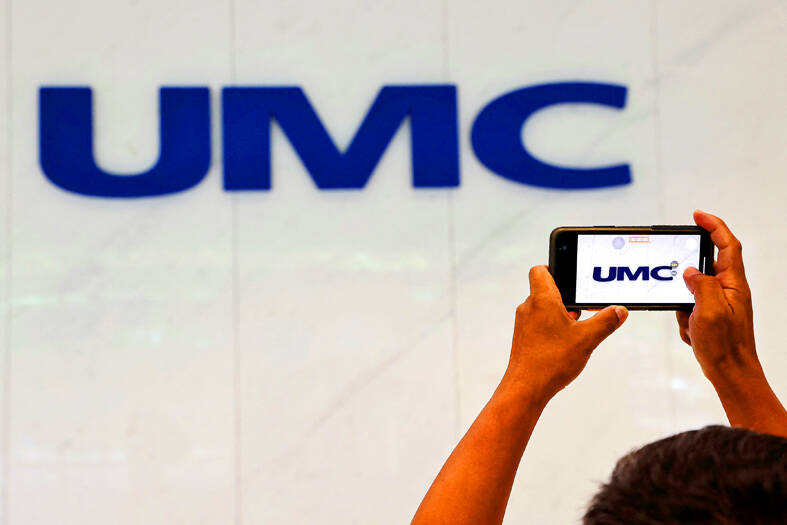United Microelectronics Corp (UMC, 聯電), the world’s No.4 foundry service provider, saw its stock price rally about 7 percent yesterday, boosted by stronger-than-expected quarterly earnings last quarter and robust business outlook.
The stock price of UMC yesterday jumped 6.94 percent to close at NT$53.9, hitting the highest level in about two weeks. The stock out-performed the TAIEX, which gained 1.99 percent yesterday. UMC was the top choice of foreign investors, who registered a net buying of 93.24 million shares yesterday.
UMC’s net profits surged 31.8 percent sequentially to NT$13.79 billion last quarter, compared with NT$10.46 billion in the first quarter, the chipmaker told a virtual investor conference on Wednesday. Earnings per share rose to NT$1.11 from NT$0.84, it said.

Photo: Ann Wang, Reuters
Gross margin improved to 35.2 percent last quarter, beating its earlier estimate of 30 percent and up from 30.9 percent in the first quarter, thanks to foreign exchange gains, it said.
For this quarter, the chipmaker expects “to see a mild pickup in communications, consumer and computing segments,” UMC copresident Jason Wang (王石) said.
The chipmaker’s 22-nanometer and 28-nanometer business remains a “promising growth driver” with a number of new chips being launched in the second half of this year for applications including display drivers, connectivity and networking, Wang said.
“However, we have not seen signs of a strong rebound yet as customers remain prudent in managing their inventories,” he said.
The automotive segment remained soft this quarter and might remain so in the next quarter, due to inventory corrections, he said, adding that the segment is expected to return to normalcy from the first quarter of next year when industry inventory becomes healthier.
Wafer shipments are expected to grow by 5 percent this quarter, accelerating from a 2.6 percent increase last quarter, Wang said.
Average selling prices would remain firm, he added.
Gross margin is likely to hover at about 35 percent, dampened by higher utilities and equipment depreciation costs, the chipmaker said.
Factory utilization rate is to rise to about 70 percent this quarter from 68 percent in the prior quarter, Wang said.
UMC has doubled its silicon interposer capacity to 6,000 units this year to cope with customer demand, Wang said.
Silicon interposers are used in advanced packaging technology for artificial intelligence (AI) chips.
UMC is considered one of the potential suppliers of advanced packaging solutions as AI chip designers are seeking to ease tight supply from Taiwan Semiconductor Manufacturing Co’s (台積電) chip-on-wafer-on-substrate solution.
UMC said it is on track to ramp up chip production at an advanced fab in Singapore, which is scheduled to enter production in January 2026, before reaching high-volume production in the second half of 2026.

Semiconductor shares in China surged yesterday after Reuters reported the US had ordered chipmaking giant Taiwan Semiconductor Manufacturing Co (TSMC, 台積電) to halt shipments of advanced chips to Chinese customers, which investors believe could accelerate Beijing’s self-reliance efforts. TSMC yesterday started to suspend shipments of certain sophisticated chips to some Chinese clients after receiving a letter from the US Department of Commerce imposing export restrictions on those products, Reuters reported on Sunday, citing an unnamed source. The US imposed export restrictions on TSMC’s 7-nanometer or more advanced designs, Reuters reported. Investors figured that would encourage authorities to support China’s industry and bought shares

TECH WAR CONTINUES: The suspension of TSMC AI chips and GPUs would be a heavy blow to China’s chip designers and would affect its competitive edge Taiwan Semiconductor Manufacturing Co (TSMC, 台積電), the world’s biggest contract chipmaker, is reportedly to halt supply of artificial intelligence (AI) chips and graphics processing units (GPUs) made on 7-nanometer or more advanced process technologies from next week in order to comply with US Department of Commerce rules. TSMC has sent e-mails to its Chinese AI customers, informing them about the suspension starting on Monday, Chinese online news outlet Ijiwei.com (愛集微) reported yesterday. The US Department of Commerce has not formally unveiled further semiconductor measures against China yet. “TSMC does not comment on market rumors. TSMC is a law-abiding company and we are

FLEXIBLE: Taiwan can develop its own ground station equipment, and has highly competitive manufacturers and suppliers with diversified production, the MOEA said The Ministry of Economic Affairs (MOEA) yesterday disputed reports that suppliers to US-based Space Exploration Technologies Corp (SpaceX) had been asked to move production out of Taiwan. Reuters had reported on Tuesday last week that Elon Musk-owned SpaceX had asked their manufacturers to produce outside of Taiwan given geopolitical risks and that at least one Taiwanese supplier had been pushed to relocate production to Vietnam. SpaceX’s requests place a renewed focus on the contentious relationship Musk has had with Taiwan, especially after he said last year that Taiwan is an “integral part” of China, sparking sharp criticism from Taiwanese authorities. The ministry said

US President Joe Biden’s administration is racing to complete CHIPS and Science Act agreements with companies such as Intel Corp and Samsung Electronics Co, aiming to shore up one of its signature initiatives before US president-elect Donald Trump enters the White House. The US Department of Commerce has allocated more than 90 percent of the US$39 billion in grants under the act, a landmark law enacted in 2022 designed to rebuild the domestic chip industry. However, the agency has only announced one binding agreement so far. The next two months would prove critical for more than 20 companies still in the process